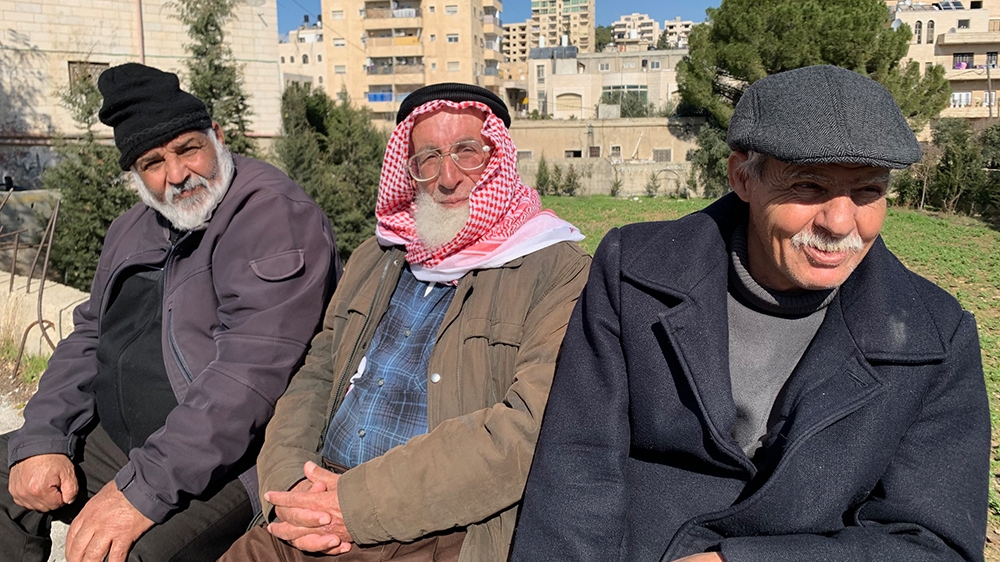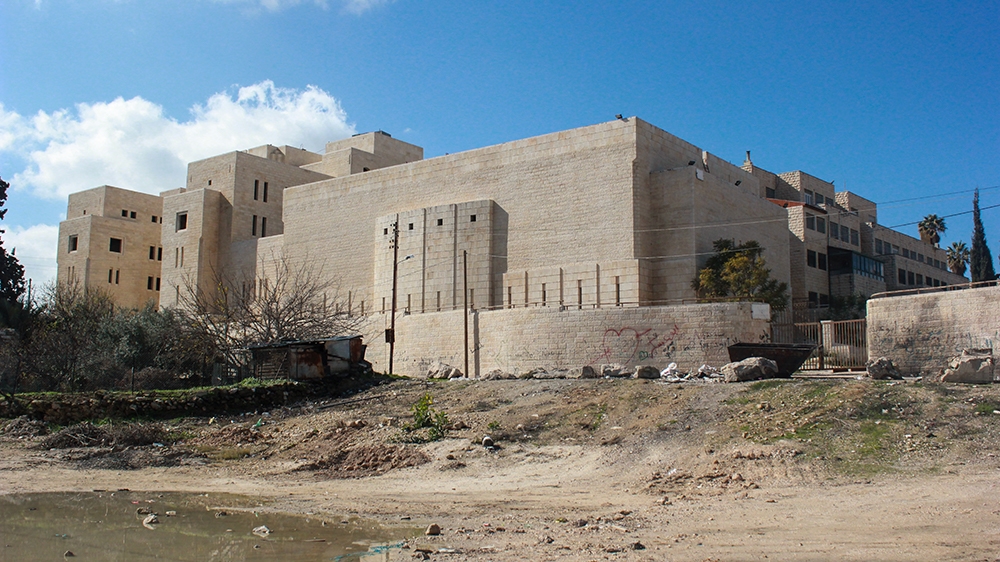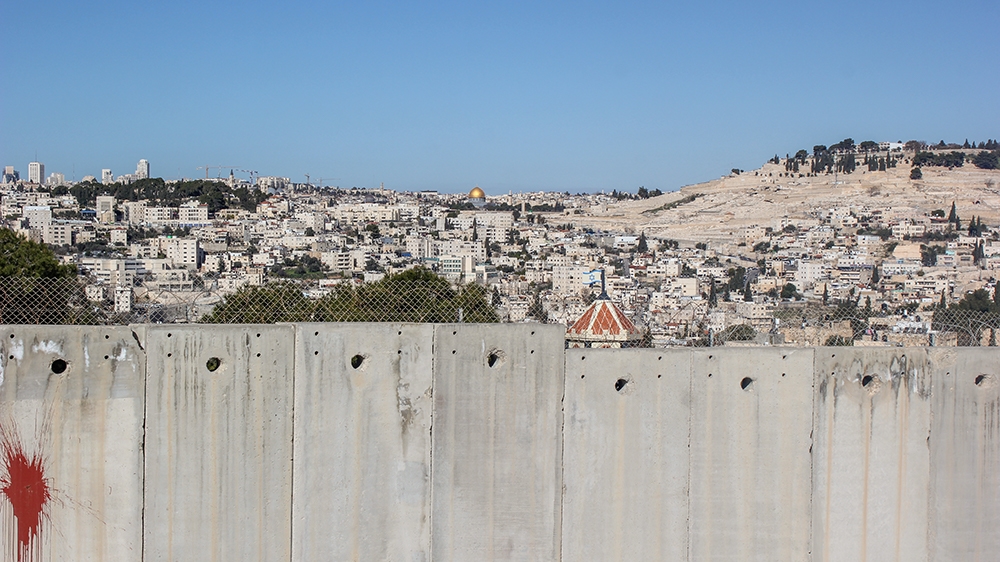
'A joke': Palestinians slam Trump's proposal for new capital
Under US proposal, a small village in East Jerusalem has been earmarked as capital of a future Palestinian state.
by Arwa IbrahimAbu Dis, occupied West Bank – Just outside of Jerusalem lies Abu Dis, a small village which US President Donald Trump's Middle East plan has earmarked as the new capital of a future Palestinian state.
Referred to as a suburb by its residents, Abu Dis is part of the Jerusalem governorate, but lies outside the municipal limits of the city.
More:
Its population of around 20,000 residents is separated from the Old City by Israel's eight-metre high illegal separation wall and cut off from surrounding areas by large Israeli settlements, also illegal.
Although a historic town, it lacks cultural and religious significance for Palestinians who regard Jerusalem as the only capital for their future state and a cradle of civilisations for its significance in all three Abrahamic faiths: Islam, Christianity and Judaism.
"Palestinians will never accept Abu Dis as their capital," said 75-year-old Khaled Muhsin, a resident of the village.
"Jerusalem is our capital, not theirs (the Israelis)," he said pointing across the separation wall and towards Jerusalem.

'Jerusalem is our capital, not theirs (the Israelis)', said Muhsin, at the centre in this photo [Arwa Ibrahim/Al Jazeera]
'Completely rejected'
Trump introduced the idea of a new capital as part of the US recognition of Palestinians' right to a state of their own.
According to the 181-page document unveiled in the White House on Tuesday, the new capital would include areas east and north of the separation wall, "including Kafr Aqab, the eastern part of Shuafat and Abu Dis, and could be named Al Quds".
But for 70-year-old Ali Mansour, a resident of Abu Dis, the US plan was "a joke".
"Abu Dis is a little village. Who on earth could think of it as the capital of Palestine?" he asked. "Not even a child would accept this."
Mansour's family was displaced in 1948 from areas a village that is now part of Israel. "Jerusalem is simply a red line for us," he said.
Even the town's mayor said he had no aspiration to make Abu Dis into a new Palestinian capital.
"We completely reject the idea. Abu Dis is just a suburb to the east of Jerusalem. We have no aspiration to be the capital of Palestine," Ahmad Abu Hilal told Al Jazeera from his office in the municipality which sits next to the Abu Dis University, one of the few significant sites in the otherwise featureless town.
Farah Hilmy, a 25-year-old student at the university which often uses the separation wall to show films during the summer, told Al Jazeera: "Proposals to make Abu Dis the capital will always fail because Jerusalem cannot be replaced."
An isolated, old plan
While Trump introduced the idea of a new Palestinian capital as part of an eastern Jerusalem, residents and experts say they were shocked by the confusion it created since Abu Dis lies outside the boundaries of the historic city.
"Abu Dis is a small historic suburb that lies to the east of Jerusalem," said Jamal Amro, a historian specialising in Jerusalem. "It is part of the governorate of Jerusalem, but sits outside the city itself."
Even for the Israelis, Abu Dis is outside the municipal city limits drawn out after their occupation of East Jerusalem in 1967.
Under the Oslo Accords, signed by the Palestine Liberation Organization and Israel in 1993 and 1995, Abu Dis became part of the occupied West Bank's Area B, which comprises about 21 percent of the West Bank and falls under the Palestinian Authority's (PA) control in matters related to education, health and economy.
The area remains under full Israeli security control, with the separation around it further isolating the lonely town's residents from the main city.
"The separation wall has taken over thousands of kilometres of our lands in Abu Dis. It divided our families and separated us from our lands and from reaching Jerusalem," Atef Erekat, 55, told Al Jazeera.
"Abu Dis is a little prison."

The Palestinian Authority's Parliament building in Abu Dis [Arwa Ibrahim/Al Jazeera]
'Jerusalem is our only capital'
Trump's plan to create a new Palestinian capital in Abu Dis has roots that go back to the 1990s when the suburb was proposed as a new base for the Palestinian Parliament.
The building was never opened, which according to Amro, highlighted Palestinians' strong rejection to the idea.
"Proposals to move the PA's parliament to Abu Dis all failed because the suburb is insignificant and isolated from Jerusalem by the separation wall and cut off from other areas by settlements on all sides," said Amro, pointing towards Ma'ale Adomim, one of Israel's largest illegal settlements near Jerusalem.
Standing next to the now derelict and abandoned building, kindergarten manager Karima Hishma, 45, said no matter how hard the US and Israel tried, Abu Dis will remain irrelevant.
"They tried for many years to give Abu Dis some importance, but none of it worked. Jerusalem is our only capital," said Hishma.
Palestinian officials leading negotiations during the Oslo Accords had envisioned East Jerusalem, which comprises the Al-Aqsa compound, as an un-negotiable capital for any future Palestinian state.
But according to Trump's plan, the compound built in the eighth century and regarded by Muslims as the third holiest site in Islam after Mecca and Medina, would be under Israeli control.
Hani Halabi, a 34-year-old activist and resident of Abu Dis summed up what Jerusalem meant for Palestinians.
"Jerusalem is the historic capital of Palestine. It is where Al-Aqsa and the Church of Holy Sepulchre are," said Halabi. "Nothing can change that in our hearts and minds."

The illegal Israeli separation wall around Abu Dis [Arwa Ibrahim/Al Jazeera]